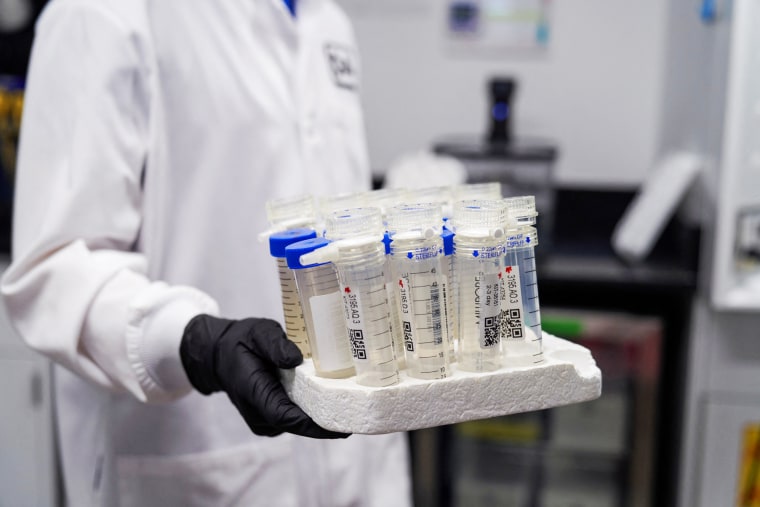Wastewater data suggest that the recent uptick in Covid cases may have peaked, at least in some areas.
Biobot Analytics, a company that tracks wastewater samples at more than 257 sites nationwide, said that the current average Covid levels across the United States are approximately 5% lower than they were last week.
"All fingers crossed," Cristin Young, a Biobot epidemiologist said, "this wave is plateauing and may be declining."
While data from the Centers for Disease Control and Prevention show a rise in Covid-related hospitalizations and deaths, wastewater may indicate what's to come.
After a mid- to late-summer rise, the CDC's Covid wastewater surveillance now shows declines in mid-Atlantic states, such as Virginia and Maryland.
The findings are backed up from surveillance in North Carolina, said Jessica Schlueter, an associate professor in the department of bioinformatics and genomics at the University of North Carolina Charlotte. Her lab is responsible for testing 12 sites across the state.
The increase in Covid wastewater samples during the last six months "seems to be peaking and starting to taper off," she said. That means a fall in cases could follow.
Wastewater collection sites in the Midwest and the Northeast, however, show a steady uptick in Covid spread.
Increases that coincide with the start of the school year have become par for the course based on the past three years of Covid activity, but are not expected to last long, said Amy Kirby, who heads the CDC's wastewater monitoring program.
"We have seen enough data over the years to know that around the time when school starts, we will start seeing some increases," she said, "which plateau and then come back down" before another winter surge.
Another monitoring system called WastewaterSCAN, which tracks 183 sites in 36 states, is slightly more conservative in its analysis of the latest Covid wastewater data.
"What we're seeing right now is a kind of 'flattening out,'" said Marlene Wolfe, an assistant professor of environmental health at Emory University and program director for WastewaterSCAN. "We haven't really seen a true downturn happen yet."
Like the CDC data, she said, the WastewaterSCAN findings indicate a current rise in Covid spread in the Midwest. That area of the country is "in this surge right now," she said.
Wastewater surveillance of viruses is the only meaningful indication of viral activity, experts said, because public health officials no longer track Covid cases.
"We have essentially given up on other types of surveillance," said Bill Hanage, an associate director at the Center for Communicable Disease Dynamics at Harvard University, as well as a scientific adviser to Biobot.
"People are testing at home," he said. "The only way we really have of keeping hold of what pandemic activity is going on is through stuff like wastewater."
Hanage likened wastewater predictions to weather reports. "That's about as close as we can to forecasting," he said.
People infected with Covid shed the virus in sewage pipes about a week before they ever feel sick and get tested for the virus. Every time a person flushes a toilet, it gives wastewater analysts an indication of how viruses like Covid are spreading long before a need for nasal swab tests.
“As long as you’re using a toilet that’s connected to the sewer system, we can get information about the health of communities without asking people to change their behavior at all. That’s why it’s so powerful,” Kirby said.
While the latest Covid wastewater data are encouraging, she said people should protect themselves against another potential uptick in viral activity in the months to come.
"Hopefully with updated vaccinations, we will not see a big winter surge as we have in the past," Kirby said. "But it's really too early to tell."
CORRECTION (Sept. 25, 2023, 1:56 p.m. ET): A previous version of this article misstated the number of sites where Biobot Analytics tracks wastewater samples. The company tracks them in more than 257 sites nationwide, not 257.
Follow NBC HEALTH on Twitter & Facebook.

